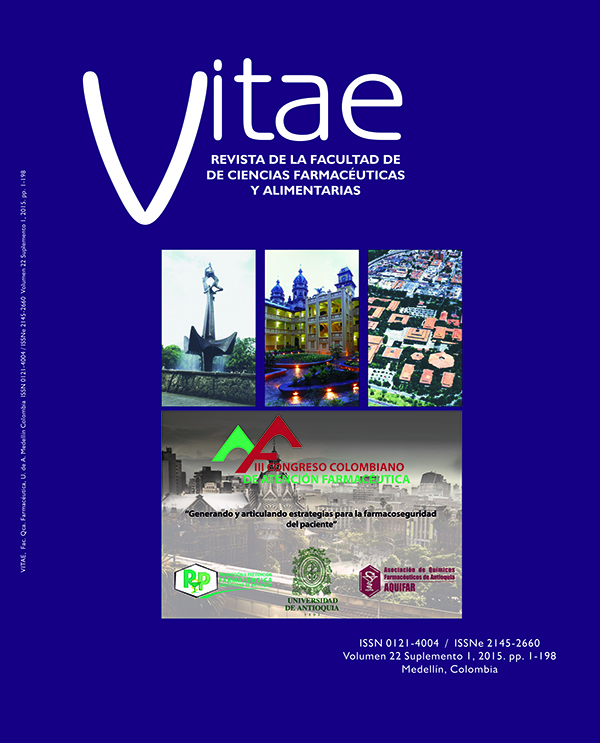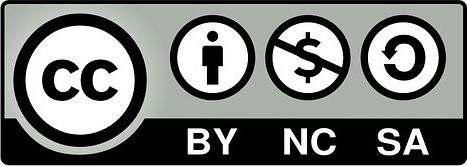Tercer Congreso Colombiano de Atención Farmacéutica
DOI:
https://doi.org/10.17533/udea.vitae.24890Keywords:
Atención farmacéutica, medicamentos, Farmacoterapia, Calidad de VidaAbstract
Aunque con las deseadas controversias al respecto, la atención farmacéutica (AF) se podría asumir como una tecnología en salud que busca alcanzar, con la intervención del farmacéutico, los mejores resultados en salud posibles, contribuyendo con la utilización efectiva, segura y económica de los medicamentos; incluyendo actividades que promuevan la salud y prevengan la enfermedad. De forma general, en el concepto de AF se ha incluido todas las intervenciones (actividades) que realiza el farmacéutico, con o sin medicamentos, orientadas al paciente, con el objetivo de conseguir el máximo beneficio posible en términos de salud (mejorar los resultados en salud). En este sentido, en el Foro de Atención Farmacéutica realizado en España, en el 2008, se estableció que la “Atención Farmacéutica es la participación activa del farmacéutico en la mejora de la calidad de vida del paciente, mediante la dispensación, indicación farmacéutica y seguimiento farmacoterapéutico”. Además se específica que: “esta participación implica la cooperación con el médico y otros profesionales sanitarios para conseguir resultados que mejoren la calidad de vida del paciente, así como su intervención en actividades que proporcionen buena salud y prevengan las enfermedades”. Por su parte, en el 2013, la Red Europea de Atención Farmacéutica -PCNE-) establece que: “Atención farmacéutica es la contribución del farmacéutico a la atención de personas con el fin de optimizar el uso de los medicamentos y mejorar los resultados en salud”. Desde una perspectiva práctica, la AF es una forma clave para contribuir a solucionar uno de los retos genuinos existentes en la sociedad: La utilización adecuada de los medicamentos. En este sentido, se ha generado evidencia de que esta tecnología, específicamente el seguimiento farmacoterapéutico (SFT), contribuye al logro de los objetivos terapéuticos en pacientes con enfermedad cardiovascular y que es una tecnología costo-efectiva. En el contexto de Colombia, se ha evidenciado que el SFT disminuye los reingresos hospitalarios en pacientes con trastorno afectivo bipolar-I de forma costo-efectiva. Por ello, la importancia de la realización de eventos académicos relacionados con la AF, caso del Congreso Colombiano de Atención Farmacéutica.
Downloads
References
NA
Downloads
Published
How to Cite
Issue
Section
License
Copyright Notice and Open Access Statement
The Journal Vitae works under the Open Access license, and the published manuscripts remain available for the public, both on the Journal's website and in databases, under the Creative Commons license, "Noncommercial Attribution" and "Share alike" systems, adopted in Colombia. Hence, when the authors agree to publish in the Journal Vitae, they will not have the right to economic retributions on publications and reproductions through different diffusion media. The documents are freely available to the internet public, permitting users to read, download, copy, distribute, print, search, or link to the full texts and pass them as data to software. The only constraint on reproduction and distribution, should be to give authors control over the integrity of their work and the right to be appropriately acknowledged and cited.
Authors declare that:
-
They are the intellectual property owners and are responsible for all the information stated in the article.
-
This manuscript has not been submitted or published in other printed or digital media. They accept the responsibility for the judgments, opinions, and points of view expressed in the published article and, therefore, they exonerate Universidad de Antioquia and Journal Vitae from any process.
-
They exempt Universidad de Antioquia and Journal Vitae from settling conflicts or disputes related to the authorship of the referred article.
-
They accept the revision of the original manuscript by suitable personnel, and they bind themselves to perform the corrections appointed or suggested by the assessors.
-
Therefore, they know the editorial process and will not bind the Editorial Board of the Journal to assume any obligations regarding the volume and issue in which the article is published.
-
They transfer the rights of publication, reprinting, and distribution of the article from the moment of its approval, in print and digital format, without the right to economic rewards, and under the licensing conditions considered relevant by Journal Vitae.
-
They fully authorize Universidad de Antioquia and Journal Vitae to submit the published material to the diverse databases and indexing systems where the Journal can be found to comply with the requirements of the regulatory authorities to maintain the national classification of journals.
-
They will assume the article publication costs established for the current issue, and they will make the payment as soon as they are informed about the volume and the issue in which the final version of the article is published.
-
After the article is published, you can share digital or printed copies in a noncommercial manner. You will be able to use the paper in your institution or company for educational or research purposes, including the use in course programs.
Conflict of interest: Authors are responsible for recognizing and disclosing any financial or other benefits that could be perceived to bias their work, acknowledging all financial support and any personal connections with potential sponsors. Examples of such conflicts include receiving research funds or honoraria, serving on advisory boards, stock ownership, or employment and consulting arrangements. Authors without such connections should clearly state that they have no financial support or personal relationships that could be perceived to bias their work. All conflicts of interest should be disclosed on the author's identification page of the manuscript.










